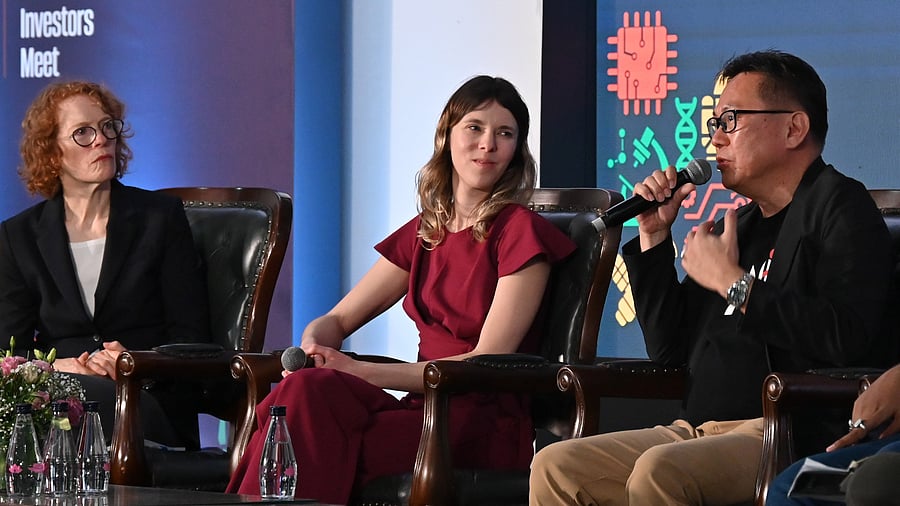
(From Left) Dean and Lucy G Moses Professor of Law, Columbia Law, Gillian Lester, Founding Member, KIRA, Anka Reuel and Founder and Managing Director, Artificial Intelligence International Institute (AIII) James Ong, talks on Crafting New Rules - A Global Approach to AI Regulation at Global Investors Meet, Invest Karnataka 2025, in Bengaluru on Thursday.
Credit: DH Photo/Pushkar V
Bengaluru: On day two of Invest Karnataka 2025, industry leaders, think tanks and academicians seem to be in agreement on the need for regulation to bring in the checks and balances in hurtling growth seen in sectors such as AI, aerospace and defence, automotive and logistics.
They unanimously dismissed concerns of regulations stifling innovation. Regulations, according to the panelists across different sessions, are a big toolkit. They can be incentives, mandates in education, hard law or soft law, listed out Gillian Lester, Dean and Lucy G Moses Professor of Law, Columbia Law School.
Anka Reuel, founding member of the independent think-tank The KIRA Center, insisted that the purpose of regulations is to foster innovation. They can be used for legal certainty. A driving motivation for regulation, other corporate leaders pointed out, was safety in these volatile and fast-paced fields.
Noting that aerospace and defence is a highly regulated industry, Savyasachi Srinivas, Vice President, Engineering at Collins Aerospace, highlighted the importance of considering safety and ethical operations, even if the cost is taking more time. Michel Narchi, Head of International Operations at Airbus, added that any small dust particle can pollute the entire system, emphasising the need to be slow.
Martin Lundstedt, President, AB Volvo and CEO, Volvo Group, underscored that without defined safety standards, it is difficult to remain competitive.
The discussions also veered to whether or not there is a need for international AI regulatory standards, though no consensus was reached on the topic. While some strongly felt this need, others believed the opposite. Reuel argued that the international governance of AI isn’t nuanced enough, which is why certain points must be found rather than trying to regulate everything at once for everyone.
Nilekani’s approach
Expanding on the role of regulations, panelists also spoke about how to cut through layers of tedious bureaucracy – not just at a corporate level, but at a government level, and the role of AI in this.
Var Shankar, Chief AI and Privacy Officer of Enzai, an AI governance platform, found Nilekani’s approach to AI, not entirely unsustainable. His argument is that using AI to streamline workflows, as recommended by Nilekani, could be helpful as long as the data value chain does not compromise privacy.
A unified approach
Whether it comes to nuanced AI governance or regulations giving an innovation boost, a running theme through panels was one emphasising synergy between actors and sectors.